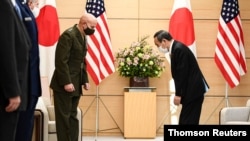Australia and Japan have agreed on a historic defense pact that would allow both countries to strengthen military ties in the face of rising tensions with China.
This is Japan’s first agreement covering the presence of foreign military forces on its soil since a deal in 1960 that permitted the United States to base troops, aircraft and warships in Japan.
The pact allows Japanese and Australian personnel to visit each other’s countries to carry out training and joint operations. Officials have spent six years negotiating the accord. Australian officials said it was a “pivotal moment in the history of Japan-Australia ties.”
The in-principal agreement has been made between Japanese Prime Minister Yoshihide Suga and his Australian counterpart, Scott Morrison, who has flown to Tokyo. The pact needs to be approved by the Japanese parliament.
Morrison, who is the first world leader to be hosted by Mr. Suga since he became Japan’s new leader in September, says bilateral ties are crucial.
“Japan has a very special relationship with Australia. It is not just an economic one, it is not just a trade one, it is not just a cultural and social one. Importantly, it is a strategic one. We play a very important role together in working in the Southwest Pacific together,” Morrison said.
Analysts have said that China’s increased assertiveness, including territorial disputes in the South China Sea and the treatment of pro-democracy campaigners in Hong Kong, would dominate private talks between the Australian and Japanese leaders.
Chinese state media has criticized the Australia-Japan accord, insisting it “clearly targets China” and “further accelerates the confrontational atmosphere in the Asia-Pacific region.”
Canberra’s relations with Beijing have deteriorated after allegations of Chinese interference in Australia’s domestic politics and calls for a global investigation into the source of the coronavirus, which was first identified in China almost a year ago.
A damaging consequence is the sanctions imposed by China on a growing list of Australian imports, including wine, barley and other agricultural products.
China is Australia’s biggest trading partner, while Japan is its second.




